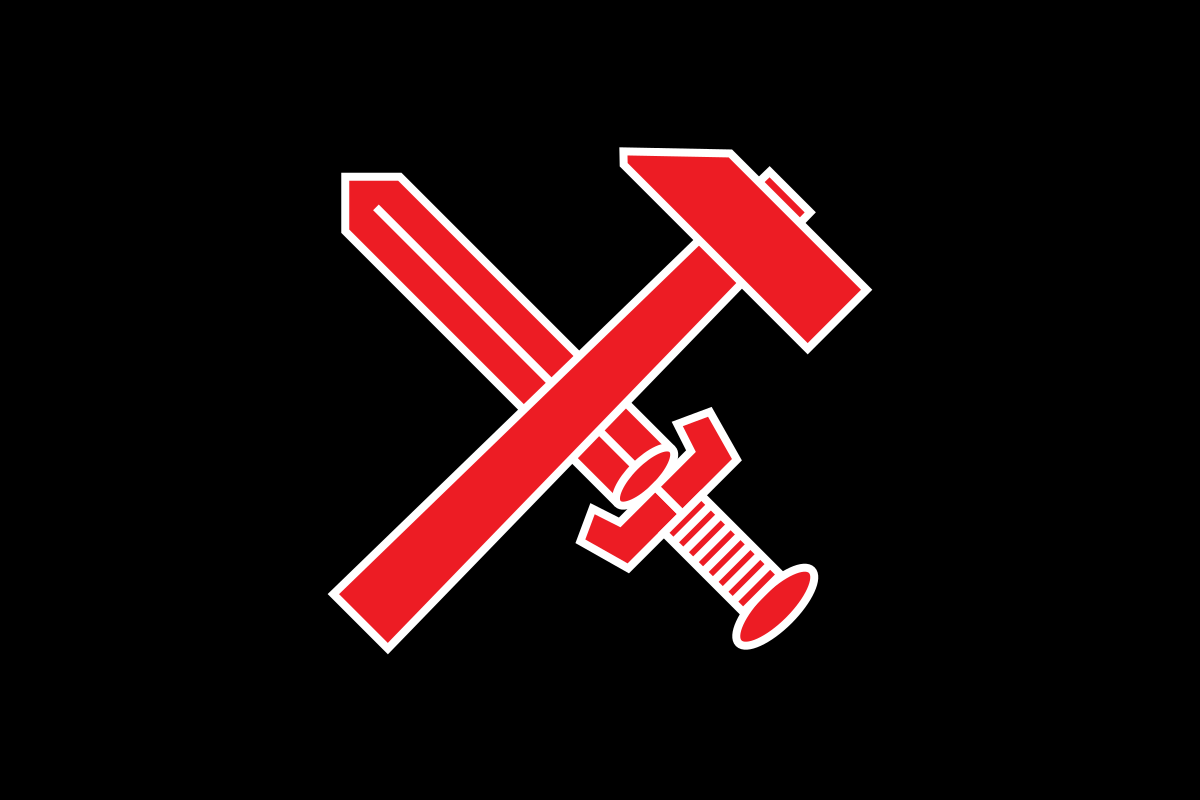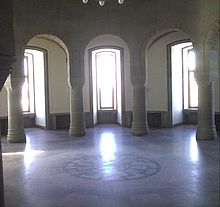More languages
More actions

Neo-fascism is a term that refers to the post-world war two ideological trends that feature ultranationalism, strong militarism, reactionism, and other features of the original fascist movements. Similar to the fascists of the 20th century, neo-fascism is born as a reaction to changing social climates, as well as growing economic hardships among the petit-bourgeoisie.
With the rise of neoliberalism, and the increasing concentration of capital into fewer-and-fewer hands, neo-fascism has gained new popularity among many nations, particularly as things such as intensifying climate change and economic hardships (the results of capitalism) ravage the middle class.[1][2]
The term "neofascist" is often vauguely defined, and besides its usage as a mere pejorative, "neo-fascism" better refers to an entire grouping of far-right trends that appeared after classical fascism largely died as a power-holding ideology after world war two.
Features
Many neo-fascist movements are created and gain popularity for similar reasons as to how the old fascists got popularity - that is to say - by using social, political, or economic chaos as a means of advocating for a return to a past golden age; or other words - a palingenesis. Commonly, the fascists of the modern epoch will blame the ills a society suffers from on a scapegoat, one that rarely ever relates to the internal economic classes of a capitalist society, and much more often, foreigners, sometimes those whom are of another (often perceived) race. In other cases, the neo-fascist will have his scapegoat be that of conspiracy, blaming the problems the people face on an underground and otherwise subversive force, regardless of how scientifically or logically false it may be. These two examples of blaming issues on a race or on a conspiracy need not conflict, as often times, the neofascist will claim that a race is preforming or at least aiding in the conspiracy. This trend is common with, for example, anti-semites.
Neo-fascists (and far-righters in general) often rely heavily on populism to spread their often xenophobic views. They will attempt to mobilize the social (often the petit-bourgeoisie) or ethnic group that their political program holds to be "the common people", and rally them to oppose a perceived enemy. Often, this enemy will be "the elitists" or "globalists", while the neo-fascist will commonly pose themselves as being "just an average Joe"; not a class enemy but a compatriot. Furthermore, the neo-fascist will attempt to make themselves a demagogue; a "common man" who can save their nation or race from a perceived enemy, or defeat the "elites". Neo-fascists will often look towards paternal figures to lead a movement, regardless of their economic standing, as such, it is highly class collaborationist, often denying class struggle in favor in national unity or "racial struggle".[3]
Neo-fascist movements
Neo-nazism

See main article: Neo-Nazism
Neo-nazism, by its most general meaning, refers to the post-world war two adherence to nazism. Neo-nazis are highly racist, often of the white supremacist and anti-semitic type, conspiratorial, and reactionary. Neo-nazism is heavily linked with the "alt-right", and can be viewed as a particular form of neo-fascism. Neo-nazis goals range from preforming terrorist actions against perceived racial "enemies", to starting a "race war", and creating a "fourth reich".
Strasserism
Strasserism is a third positionist ideology based on nazism. Strasserism is based on the works of Gregor and Otto Strasser, who were both associated with the National Socialist German Workers' Party. Strasserism calls for a more worker-based and socialistic form of regular Nazism. However, much like Nazism, strasserism is greatly anti-semitic, only in the case of strasserism, its racist conspiracy theories are built off economic anti-semitism, that is, a form of anti-semitism where the reason why jewish people are used as a scapegoat for economic ills is because, supposedly, they are of a higher economic status than the racially-pure worker.[4]
Ecofascism
Ecofascism, outside its derogatory usage by reactionaries to insult anybody who accepts the existence of man-made climate change, refers to the ideological trends that syndicate hard-line environmentalism with ultranationalism and xenophobia. Ecofascists view Earth as a malthusian battleground between racial and ethnic groups, and think that ecological harmony is tied with ethnic or racial monodominance. To combat climate change, ecofascists believe not only in things such as eugenics, but also in the purging of ethnic minorites, by means of forced relocation or otherwise.[5]
Ecofascism is greatly inspired by nazism, particularly, the "blood and soil" idea, which states that a race is attached with the land it inhabits. Many ecofascists are neo-pagans, mostly worshiping the norse pantheon, largely because they are perceived by ecofascists as being "racially" pure "heroes" of "white people". In online ecofascist groups, the algiz rune "ᛉ" is often used. The algiz rune symbolizes life, that is in the case of ecofascists, life for nature and white people. The algiz rune was also a symbol for lebensraum; the nazi plan for the enslavement and extermination of the Slavic inhabitants of Eastern Europe, and colonization by ethnic Germans.[6]
"Alt-right"
The term "alt-right" refers to a loose grouping of far-right extremists, largely based on the internet. Alt-righters are often "white nationalists" (white supremacists), neo-nazis, highly misogynistic, and otherwise hateful. Many alt-righters claim to be promoting a form of identity politics, that is, for the support of white people or white males, against perceived repression from ethnic minorities and females. Many other alt-righters are openly white-supremacist, and otherwise seek to create a white ethno-state, often motivated by bloated and fear-mongering reports of "illegal aliens" (non-white people) that come from the Statesian capitalist news.[7]
Fourth Political Theory

In 2009, the russian political theorist Aleksandr Dugin formulated the fourth political theory. The other three were liberalism, fascism, and marxism-leninism. The fourth political theory, as Dugin claims, takes the "bad" aspects of each, percived or real, and combines the "good" aspects of the three to create a "timeless" ideology. The fourth political theory, along with Aleksandr Dugin's other ideas, have been used by the eurasianist movement and other far-right groups.[8]
Rashism
"Rashism", or " ruscism" (a combination of "russia" and "fascism") is a phrase invented by ukrainian and NATO propaganda to demonize the Russian Federation. The phrase gained massive popularity in 2022 with the conflict in Ukraine. Similar to the term "Stalinism", rashism has yet to see any usage with the government of the Russian Federation.[9]
Esoteric nazism
Esoteric nazism refers to any form of nazism that integrates racialism into a mystical or theological system. Esoteric nazis often view the "aryan" race as having come from some otherworldly place, often the legendary land of hyperborea. Esoteric nazis also are often neo-pagans, commonly nordic or greco-roman pagans. Esoteric nazis also subscribe to other pseudoscientific or pseudohistorical theories, often entailing UFOs, nazi bunkers in antarctica, among other things.[10][11]
Trumpism
See main article: Trumpism
Created out of an environment of economic turmoil (That is, for the reactionary petite-bourgeoisie) in the United States of America, Trumpism refers to the ultranationalistic, xenophobic, and populist political trends that were created as a result of multi-billionaire-president Donald Trump’s rule, particularly in the USA and Canada. Trumpism, as an ideology of sorts, can be seen in neo-fascist extremist groups such as the Proud Boys, Three Percenters, and Oathkeepers.
Trump’s rule ended in an attempted putsch of the American government, mainly done by the Far-right paramilitary groups mentioned above. The putsch (often referred to in the capitalist media as the “Jan. 6 insurrection" or riot), was motivated by false conspiracy theories about the 2020 election being rigged in favor of the democrats, as well as Trump’s personal agitation.
See also
References
- ↑ Marc-André Argentino, Blyth Crawford, Florence Keen, Hannah Rose (2021). [https://icsr.info/wp-content/uploads/2021/04/ICSR-Report-Far-From-Gone-The-Evolution-of-Extremism-in-the-First-100-Days-of-the-Biden-Administration.pdf Far From Gone: The Evolution of Extremism in the First 100 Days of the Biden Administration]. London: International Centre for the Study of Radicalisation..
- ↑ "Understanding the Rise of the Far Right: The Need for a Historical Approach". EuropeNow. Retrieved 2022-6-20.
- ↑ “The term neo-fascism defines primarily those political and ideological groups and parties that operated after 1945, especially in Europe, and which were directly inspired by the experience of the inter-war fascist and Nazi regimes in Germany, Italy, and other European countries. These groups were often made up of remnants of fascist and Nazi activists who were not prepared to give up their political militancy or indeed to renounce their ideologies despite military defeat. Many held radical and uncompromising views, emphasizing the revolutionary nature of fascism rather than its more ‘reassuring’nationalist or statist version. This article analyses neo-fascism after the Second World War; neo-fascism and anti-communism in the United States; neo-fascism during the Cold War; the second-generation neo-fascists after 1968; the extreme right today; and the neo-fascist legacy.”
Anna Cento Bull (2012). The Oxford Handbook of Fascism: 'Neo-fascism' (pp. 586–605). Oxford university press. doi: https://doi.org/10.1093/oxfordhb/9780199594788.013.0032 [HUB] - ↑ Christopher T. Husbands (2020). Militant neo-Nazism in the 1990s. ISBN 9780429060076
- ↑ Alistair Walsh (2022-5-19). "Eco-fascism: The greenwashing of the far right" Deutsche Welle. Retrieved 2022-6-21.
- ↑ Sarah Manavis (2018-9-21). "Eco-fascism: The ideology marrying environmentalism and white supremacy thriving online" The Newstatesman.
- ↑ "Ideology: Alt-right". Southern Poverty Law Center.
- ↑ Yaël Ossowski (May, 2018). "Existence Above Individuals: Disentangling Dugin’s ‘Fourth Political Theory’ and Rage Against Postmodernism" Devolution Review.
- ↑ Alexander J. Motyl (2015-4-23). "Is Putin’s Russia Fascist?" Atlantic Council. Retrieved 2022-6-21.
- ↑ "Former neo-nazi explains ‘Esoteric Nazism’". Southern Poverty Law Center.
- ↑ "Savitri Devi: The mystical fascist being resurrected by the alt-right" (2017-10-29). BBC. Retrieved 2022-6-21.
